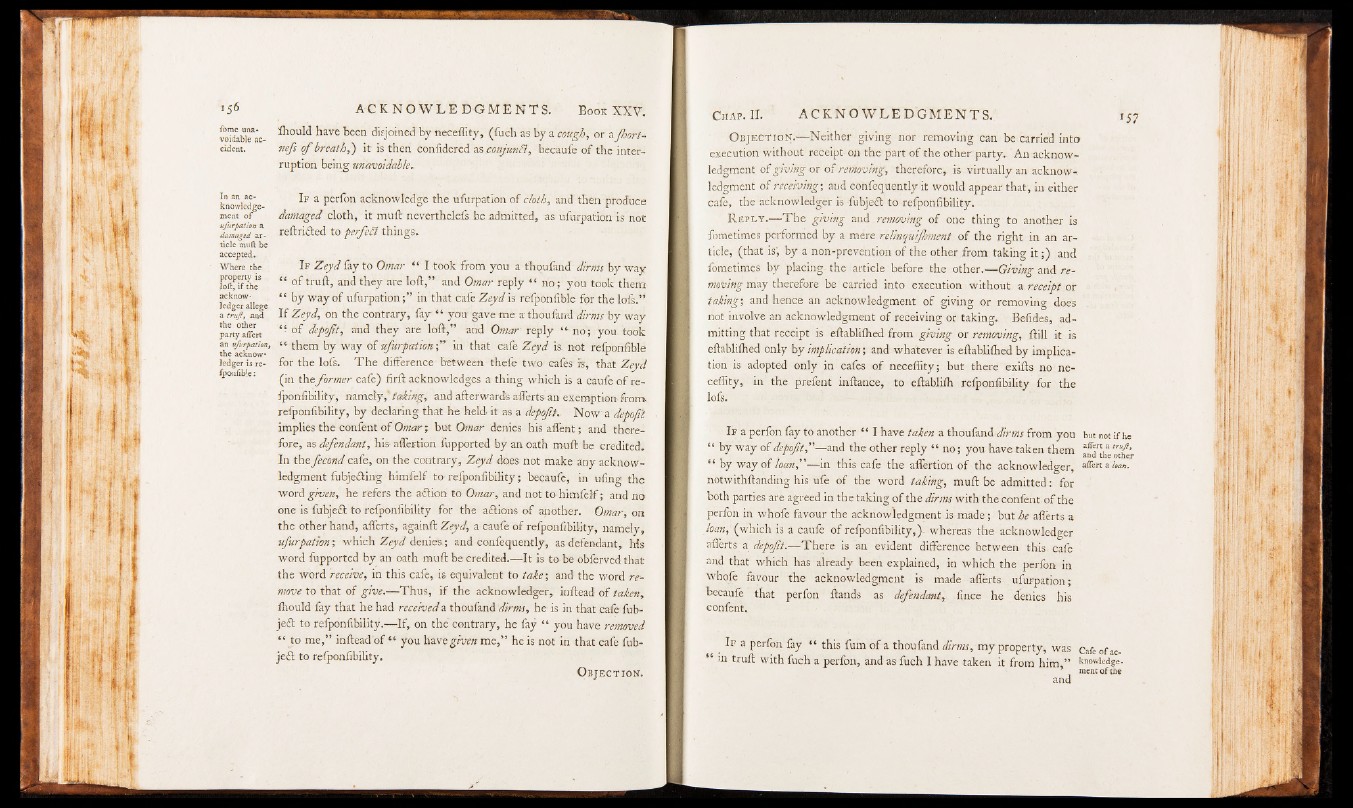
fome unavoidable
accident.
In an acknowledgement
o f
■ ufurpation a
damaged article
mu ft be
accepted.
Where the
property is
loft, if the
acknowledger
allege
a trujî) and
the other
party alfert
an ufurpation,
the acknowledger
is re-
Iponlibîe :
fhould have been disjoined by neceffity, (fuch as by a cough, or a Jhort-
nefs o f breath, ) it is then confidered as zonjundl, becaufe of the interruption
being unavoidable.
If a perfon acknowledge the ufurpation of cloth, and then produce
damaged cloth, it muft neverthelefs be .admitted, as ufurpation is not
reftriéted to perfedt things.
If Zeyd lay to Omar “ I took from you a thoufand dirms by way
“ of truft, and they are loft,” and Omar reply “ no; you took them
“ by way of ufurpat ionin that cafe Zeyd is refponfible for the lofs.”
I f Zeyd, on the contrary, fay “ you' gave me a thoufand dirms by way
“ of depoft, and they are loft,” and Omar reply “ no; you took
“ them by way of ufurpation" in that cafe Zeyd is not refponfible
for the lofs. The difference- between thefe two cafés is, that Zeyd
(in theformer cafe) firft acknowledges a thing which is a caufe of re-
fponfibility, namely,' taking, and afterwards afferts an exemption from
refponfibility, by declaring that he held, it as a depoft.. Now a depoft
implies the confent of Omar; but Omar denies his aflent; and therefore,
as defendant, his aflertion fupported by an oath muft be credited.
In the fecond cafe, on the contrary, Zeyd does not make any acknowledgment
fubjeöing himfelf to' refponfibility; becaufe, in ufin°= the
word given, he refers the aftion to Omar, and not to himfelf; and no
one is fubjeft to refponfibility for the adtions of another. Omar, on
the other hand, afferts, againft Zeyd, a caufe of refponfibility, namely,
ufurpation; which Zeyd deniek; and confequently, as defendant, his
word fupported by an oath muft be credited.— It is to be obferved that
the word receive, in this cafe, is equivalent to take; and the word remove
to that of give.— Thus, if the acknowledger, inftead of taken,
fhould fay that he had received a thoufand dirms, he is in that cafe fub-
jeft to refponfibility.— If, on thé contrary, he fay “ you have removed
“ to me,” inftead of “ you have given me,” he is not in that cafe fub-
je£t to refponfibility.
O b j e c t i o n .
O b j e c t i o n .— Neither giving nor removing can be carried into
execution without receipt on the part of the other: party.."An acknowledgment
of giving or of removing, therefore, is virtually an acknow-.
ledgment of receiving-, and confequently it would appear that, in either
cafe, the acknowledger is fubjedt to refponfibility.
R e p l y .— The giving and removing of one thing to another is
fometimes performed by a mere relinquifiment of the right in an article,
(that is; by a non-prevention of the other from taking i t ;) and
fometimes by placing- the article before the other.— Giving and removing
may therefore be carried into execution without a receipt or
taking; and hence an acknowledgment of giving or removing does
not involve an acknowledgment of receiving or taking. Befides, admitting
that receipt is eftablifhed from giving or removing, ftill it is
eftablifhed only by implication; and whatever is eftablifhed by implications'i^
adopted only in cafes of neceflity; but there exifts no ne-
ceflity, in the pr,efent infta-nce, to eftablifh refponfibility for the
lofs.
I f a perfon fay to another “ I have taken a thoufand dirms from you but not i f he
“ by way of depoft,"—and the other reply “ no; you have taken them | H £ B 9
“ by way of/oa»,”— in this cafe the aflertion of the acknowledger, aflat»*«*,
notwithftanding his ufe of the word taking, muft be admitted: far
both parties are agreed in the taking of the dirms with the confent of the
perfon in whofe favour the acknowledgment's made; but he afferts a
loan, (which is a caufe of refponfibility,)- whereas the acknowledger
afferts a depoft.— There is an evident difference between this, cafe
and that which has already been explained, in which the perfon in
whofe favour the acknowledgment is made afferts ufurpation;
becaufe that perfon ftands as defendant,. fince he denies his
confent.
If a perfon fay “ this fum of a thoufand dirms, my property* was
‘ ‘ in truft with fuch a perfon, and as fuch 1 have taken it from him,”
and
Cafe o f acknowledgement
o f the